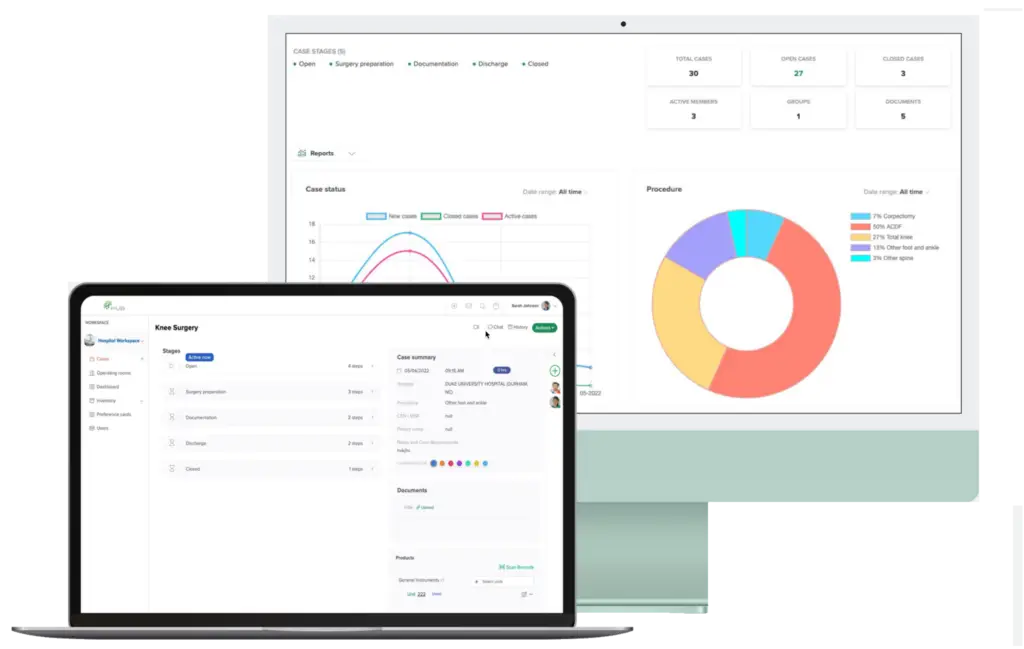In today’s digital age, healthcare facilities are increasingly reliant on technology to streamline operations and enhance patient care. However, this reliance comes with significant risks, especially for Ambulatory Surgery Center (ASC) administrators. The growing threat of cyber attacks and security breaches in healthcare necessitates robust cybersecurity measures. This post explores the cyber security risks faced by ASC administrators and how HUB Healthcare’s advanced security capabilities can help mitigate these threats.

Understanding Cyber Security Risks in Healthcare
The Growing Threat Landscape
Cybersecurity in healthcare is a critical concern, given the sensitive nature of patient data and the potential consequences of data breaches. Cyber attacks can lead to the unauthorized access of patient records, financial information, and other confidential data. The healthcare sector has witnessed a surge in cyber attacks and security breaches in recent years, making it imperative for ASC administrators to prioritize cyber security.
Common Cyber Security Threats
- Phishing Attacks: Malicious emails designed to steal personal information.
- Ransomware: Malware that encrypts data and demands a ransom for its release.
- Insider Threats: Employees or contractors who intentionally or unintentionally compromise security.
- Advanced Persistent Threats (APTs): Prolonged and targeted attacks aimed at stealing sensitive information.
- Data Theft: Unauthorized access to and theft of sensitive patient data.
Impact on ASCs
The impact of cyber security breaches on ASCs can be devastating, leading to financial losses, legal repercussions, and damage to reputation. Additionally, compromised patient data can result in severe consequences for patients, including identity theft and privacy violations.
HUB Healthcare’s Security Capabilities
Robust Cyber Security Infrastructure
HUB Healthcare offers a comprehensive cyber security infrastructure tailored to the healthcare sector. Our platform ensures that all data is securely encrypted and stored on AWS servers, with exclusive access to the encryption key provided to the customer. This robust infrastructure is designed to protect against a wide range of cyber threats.
Key Features of HUB Healthcare’s Security
- Data Encryption: Ensures all sensitive data is encrypted both in transit and at rest.
- Access Control: Implements strict access controls to limit data access to authorized personnel only.
- Regular Security Audits: Conducts regular audits to identify and mitigate potential vulnerabilities.
- Incident Response Plan: A well-defined incident response plan to quickly address and contain security breaches.
- Compliance Management: Ensures compliance with HIPAA and other relevant regulations to safeguard patient data.
Cyber Security Training
An essential component of HUB Healthcare’s cyber security strategy is providing comprehensive cyber security training for healthcare staff. This training covers the latest threats, safe online practices, and protocols to follow in case of a suspected breach. Cyber security training data healthcare modules are designed to keep staff informed and prepared.
Implementing Cyber Security Best Practices
Regularly Update Software and Systems
Keeping all software and systems up to date is crucial to protect against known vulnerabilities. Regular updates and patches should be applied promptly to mitigate the risk of exploitation by cyber criminals.
Employ Multi-Factor Authentication (MFA)
Multi-factor authentication adds an extra layer of security by requiring multiple forms of verification before granting access to sensitive data. This significantly reduces the risk of unauthorized access.
Conduct Regular Security Assessments
Regular security assessments and penetration testing help identify and address potential vulnerabilities before they can be exploited. These assessments are a critical part of a proactive cyber security strategy.
Foster a Culture of Security Awareness
Creating a culture of security awareness within the organization is vital. Regular training sessions, workshops, and reminders about safe online practices can help ensure that all staff members are vigilant and informed about the latest cyber threats.
Conclusion
As cyber threats continue to evolve, ASC administrators must remain vigilant and proactive in protecting patient data. HUB Healthcare’s advanced security capabilities provide a robust foundation to safeguard sensitive information and ensure compliance with regulatory standards. By implementing best practices and fostering a culture of security awareness, ASCs can significantly reduce the risk of cyber attacks and security breaches.
Call to Action
Stay ahead of cyber threats and protect your ASC with HUB Healthcare’s comprehensive cyber security solutions. Contact us today to learn more about how we can help secure your healthcare facility and ensure the safety of your patients’ data.

How HUB Healthcare Can Help
HUB Healthcare offers a comprehensive solution designed to ensure HIPAA-compliant communication in healthcare settings. With features such as secure messaging, encrypted document management, and detailed audit trails, HUB Healthcare provides the necessary tools to protect patient information and comply with HIPAA regulations. By leveraging HUB Healthcare’s robust platform, healthcare organizations can facilitate secure and efficient communication, ultimately improving patient care and operational efficiency. CMS
